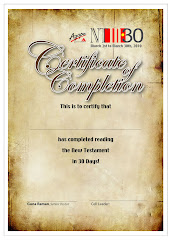

The scene in Acts 20:13-37 is touching. When Paul said goodbye to the leaders of Ephesus he knew he would never see them again in this life. Luke, watching, said, "They all wept as they embraced him and kissed him" (v.37). It was a sad but fond farewell. Somehow in just two brief years an unbreakable bond had been forged between Paul and these converts.
Square that scene with our own farewells. When you say goodbye to a group of friends, would there be such emotion? What made these people in Ephesus so fond of Paul? Paul must have built such strong, close relationships with them. How can we learn to be close to others ourselves? How can the cell community become that close? How can a mentoring group forge such closeness?
Look at Paul. Paul let people know how he lived (v.18). They saw his life close range. Often times, we tend to keep people at arm's length to our private life; our domestic life. No one knows what is happening behind the closed doors of our homes and our lives.
Paul opened up his life, and invited people to see and know the real him. In that sense, Paul was a man who had nothing to hide. That kind of a life is truly a life of total freedom. He was the same person everywhere. Thus he said, "You know" several times as he reviewed his way of life in Ephesus. Being willing to share ourselves is the key to intimacy, be it in a cell group or a mentoring group.
So when people saw Paul living out his life, it created a bond of deep love and affection between Paul and the Ephesians. Cell leaders, take note. The transparency and authenticity of your cell members will never rise above your personal transparency and authenticity. When you share your life openly, you create a safe place for your members to be open about their lives. And when the day of farewell comes, I bet there will be many tears!









